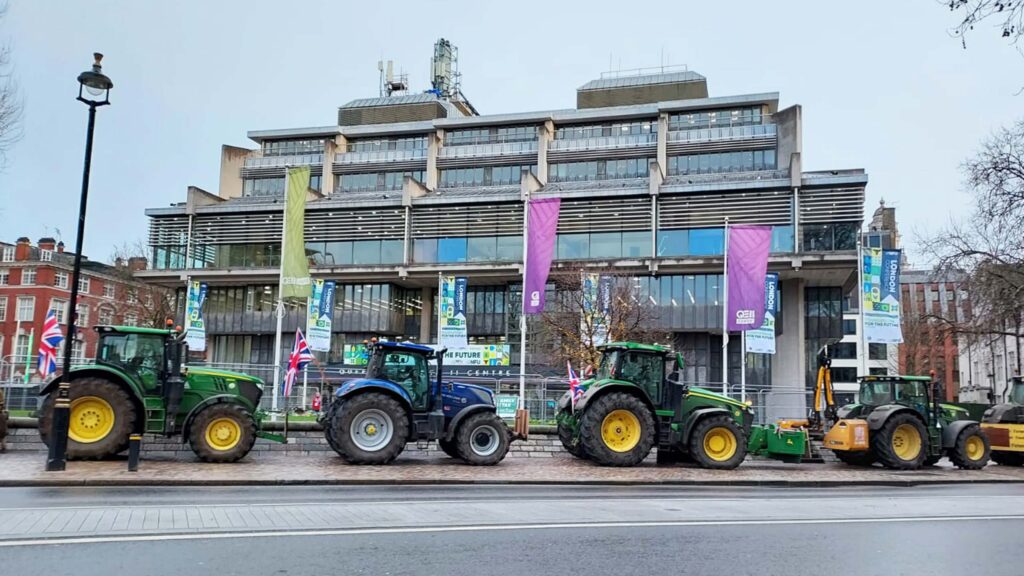Defra secretary unveils HLS payment rises and key reforms
 © MAG/Charlie Reeve
© MAG/Charlie Reeve Defra secretary Steve Reed has unveiled a number of key policy reforms, including an increase in payment rates for the Higher Level Stewardship (HLS) scheme, at the NFU conference in London on Tuesday (25 February).
The announcement forms part of a wider package of measures designed to boost the profitability of UK farmers and secure long-term food production.
However, farmers expecting updates on the controversial farm inheritance tax plans were left disappointed, with no new information provided.
See also: Steve Reed to reveal 50% public procurement targets for food
The NFU conference is being held at the QEII Centre in Westminster, while a separate “net zero” event is taking place at the venue on the same day.
A “ring of steel” has been erected outside the venue, but outside this, farmers have parked their tractors to give Mr Reed a noisy reception and a reminder that they remain angry and deeply frustrated with the government’s failure to rethink its IHT reforms, and its “anti-farming agenda”.
HLS payment increase
As part of his announcement, Mr Reed indicated that some £30m is being made available to bolster HLS payment rates, “to bring them closely in line with other schemes”.
Victoria Vyvyan, president of the Country Land and Business Association (CLA), welcomed the HLS payment increases, but stressed the need for clarity on funding.
“This is a welcome announcement and will boost thousands of agreement holders, but clarity on funding is crucial,” she said.
Alice Groom of the RSPB has also praised the payment rises, highlighting their potential to support biodiversity and climate resilience.
She has also called for a clear pathway for Higher Tier Countryside Stewardship, urging greater investment to meet climate and nature targets.
Profitability crisis
In his speech, Mr Reed outlined the government’s commitment to tackling the profitability crisis that has long affected UK farming.
He acknowledged that farmers “don’t earn enough for the hard work they put in” and committed to improving profitability across the sector.
Other significant reforms in the government’s package include:
- Resumption of capital grants A new round of capital grants will begin this summer, with new caps and controls to ensure farmers can invest in critical equipment and infrastructure. Every one of the 4,000 applications submitted in 2024 will proceed.
- Extension of the seasonal worker visa scheme The government has extended the scheme for another five years, ensuring a steady flow of workers for UK farms.
- Farming in Protected Landscapes extension The programme has been extended by a year, to 2026, although the funding details are still being finalised.
- British food summit The government will hold a British food summit in early summer, hosted by prime minister Sir Keir Starmer, to discuss strategies for strengthening UK food security.
In addition to these measures, the government has pledged £110m to agricultural innovation, focusing on eco-friendly technology such as chemical-free cleaning for milking equipment and electric weeders to reduce chemicals use.
The announcement also includes a £200m investment in strengthening the UK’s biosecurity, along with a new National Biosecurity Centre to improve resilience against animal diseases.
The government also reaffirmed its commitment to protecting British farmers in trade deals by upholding high environmental and animal welfare standards.
Reset needed
Commenting on the announcements, NFU president Tom Bradshaw said the time had come for a “reset” in relations with the government, citing concerns over agricultural transition and the inheritance tax changes due to take effect in April 2026, which will impose a 20% tax on farm assets worth more than £1m.
Mr Bradshaw added that the government’s farm IHT policy is “morally and economically wrong”.
He was particularly worried about the impact of the policy on elderly farmers and the next generation.
“The claim made by Treasury that 73% of farmers will be unaffected by this tax has long been debunked,” he said.
“And it’s not just the NFU that thinks the government’s figures are wrong. All major opposition parties have said so. The agricultural valuers say so. The CBI says so. Even Labour’s own tax advisers say so. All of the UK’s major supermarkets have called for the government to pause and consult.
“There is still time for this government to reset its relationship with farming and rural Britian, as Sir Keir Starmer told this conference he would in 2023.
“If ministers work in partnership with us to deliver these blueprints, and finally do the right thing on the family farm tax, then the foundations of the future will look a lot brighter.”
